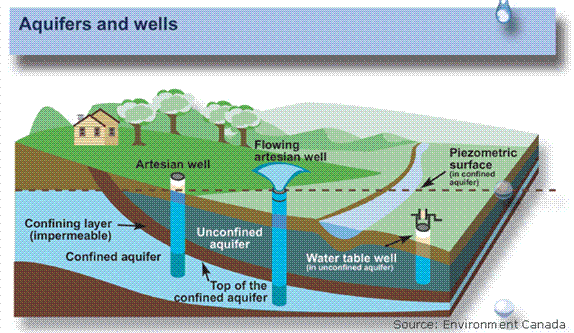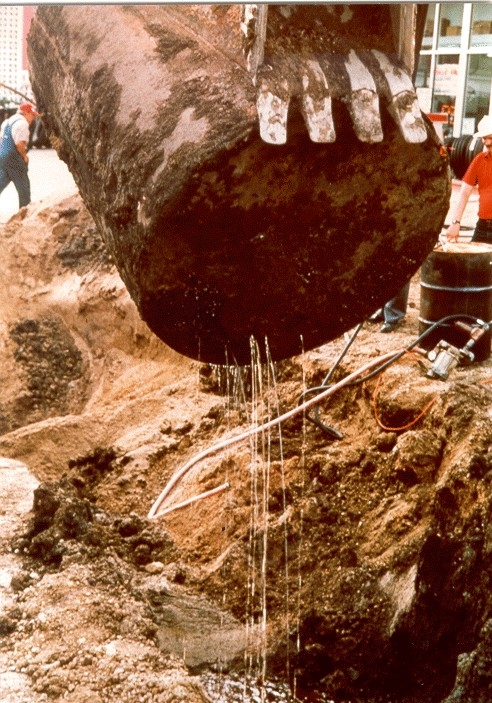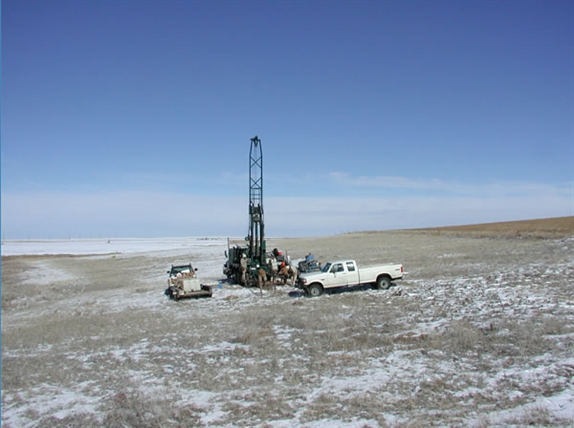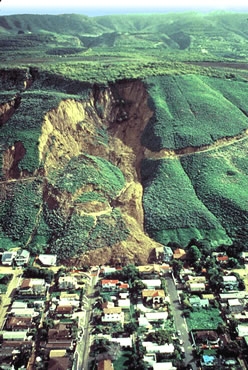- Home
- About AEG
- Membership
- Licensure
- Conferences & Webinars
- Publications
- Volunteer
- Students and Educators
Thirsty?
Finding, developing, and managing ground water supplies is only a part of what hydrogeologists do. Hydrogeologists and the skills they provide are used to prevent clean ground water from becoming polluted or to restore formerly clean water supplies that have become polluted and need to be cleaned up. In some situations, ground water may not be a benefit, but a hazard, to the health and safety of the public. It may damage the environment and even cause damage or destruction to private and public property. For example, in construction excavations or in tunnels, ground water may cause damage or destruction to private and public property.  Reasons for Conducting InvestigationsPicking a water well location
Hydrogeologists can often be found at the drill site during drilling where they can monitor the progress and provide input when the unexpected occurs . They are involved in designing the well, including determining the diameter, screen interval and size, and pump size necessary to meet the needs of the client. Water QualityFinding and developing the proper quantity of ground water is one thing, but making sure the water is fit to drink is an entirely different matter. Water is a very good solvent in that many minerals will dissolve to one degree or another in the presence of water. Water hardness describes the amount of minerals dissolved in water. Hard water causes scaling on boilers and faucets and requires more detergent for laundering clothes. Water softeners are designed to reduce the amount of a particular type of dissolved mineral called calcium. Hard-water deposits are caused by calcium, magnesium, and other metals. Water hardness varies by location due to the types of rocks hosting ground water and to the local climate. The softest waters (that is, water relatively free of dissolved minerals) are found in New England, the South Atlantic Gulf, the Pacific Northwest, and in Hawaii. Waters of moderate hardness are found in the Midwest and Great Lakes States. The hardest waters are located in Texas, New Mexico, Kansas, Arizona, and Southern California. These minerals are completely natural but not necessarily completely safe. While calcium is relatively innocuous, in some areas ground water contains excessive amounts of toxic minerals such as arsenic. If water has too much dissolved minerals or the wrong kind of dissolved minerals, people and animals cannot drink it and crops irrigated with it will die. Hydrogeologists make sure that we have the necessary quantity of water to serve our needs and the water does not have too high a quantity of dissolved minerals. Contamination
When possible, hydrogeologists work with planners and elected officials to identify areas contributing water to public supply wells and to protect these areas from potential contamination by regulating the types of activities which may occur there. Groundwater as a ProblemSometimes, water can be a problem, not a benefit. Water, in the wrong place at the wrong time, such as at a construction site, can be a hazard to the construction crew and can cause major delays in the project. Prior to planning an excavation, the services of a hydrogeologist are used to determine if ground water seepage into the site would pose a potential problem. If warranted, the hydrogeologist should be capable of designing a system to dewater the site, which will allow construction to proceed. Dams provide a number of benefits to the public including water storage and management, flood control, hydroelectric power generation and recreation. When not controlled, seepage through and around dams can undermine the structure causing catastrophic failure and loss of life and property. During dam design and construction, hydrogeologists analyze the potential for seepage and provide input into the dam components designed to prevent seepage. In mines and tunnels, water is frequently found seeping into the excavation. This may raise safety concerns during and after construction.
Sometimes it is not the water itself but the absence of water that causes a problem. In some places, pumping water out of the ground for use elsewhere removes part of the ground support, causing subsidence. When subsidence occurs in populated areas, there is a concern for property loss and injuries. Hydrogeologists can help identify situations where these hazards may occur and they can be part of a team to remediate these situations when they do occur. The Role of AEG in HydrogeologyAEG is devoted to developing professional responsibility on the part of environmental geologists, engineering geologists, and hydrogeologists. AEG provides technical and professional short courses, seminars, and technical meetings. AEG’s members contribute to public safety and provide public information and education through its website and member participation in their communities. AEG supports students in the fields of applied geology so that they develop strong technical backgrounds. AEG seeks to maintain high professional standards and enhance awareness of the responsibility of environmental geologists, engineering geologists, and hydrogeologists to the public in general. |


 Water is an essential part of life on Earth. We enjoy good health and an improved standard of living when we have plentiful, clean water to drink, to give to our livestock, and to irrigate our crops. Most of the world derives their water from surface water supplies. Unfortunately, many people do not have a reliable source of clean water from rivers, lakes, or reservoirs so they must use water from underground. This water is called ground water and a hydrogeologist is the professional that knows how to find and deliver this water to you.
Water is an essential part of life on Earth. We enjoy good health and an improved standard of living when we have plentiful, clean water to drink, to give to our livestock, and to irrigate our crops. Most of the world derives their water from surface water supplies. Unfortunately, many people do not have a reliable source of clean water from rivers, lakes, or reservoirs so they must use water from underground. This water is called ground water and a hydrogeologist is the professional that knows how to find and deliver this water to you.

 Whether you are a private homeowner or a large municipality, in order to use your groundwater resources, you must install a well. Hydrogeologists can determine the best place to locate a water supply well. They also decide how deep the well must be. To do this, they must be familiar with the local geology and the distribution of aquifers. They may use a number of tools and a variety of technologies to help them map the subsurface.
Whether you are a private homeowner or a large municipality, in order to use your groundwater resources, you must install a well. Hydrogeologists can determine the best place to locate a water supply well. They also decide how deep the well must be. To do this, they must be familiar with the local geology and the distribution of aquifers. They may use a number of tools and a variety of technologies to help them map the subsurface. Potable ground water is often found near the surface of the earth. Being so close to the surface, this water can be easily polluted by contaminants. When ground water becomes contaminated, hydrogeologists and environmental geologists study the sites and work with environmental engineers on how to remediate the problem.
Potable ground water is often found near the surface of the earth. Being so close to the surface, this water can be easily polluted by contaminants. When ground water becomes contaminated, hydrogeologists and environmental geologists study the sites and work with environmental engineers on how to remediate the problem.
.jpg)